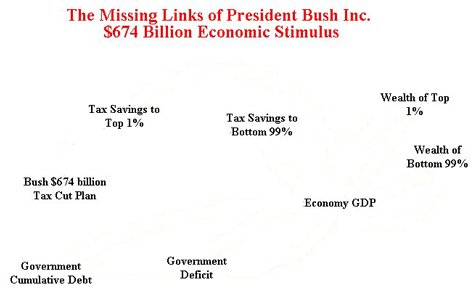|
President Bush Inc.'s $674 billion Stimulus Package: |
|||||||
| Nipawin - Friday - January 10, 2003 - by: Mario deSantis | |||||||
|
|||||||
|
|
|
||||||
|
|
|||||||
|
crony |
I contend that we have a responsibility to be creative and intelligent within our individual and social context. In my first writings in Ensign, I expressed my furor to our Saskatchewan governmental and corporative leadership to the extent that I stated that our local leaders were the worst copycats and backstabbers of North America. I was wrong as copycats and backstabbers are the byproducts of the American crony capitalism legitimized with the privatization of our governments. I know better today about economics and politics. And yes, I can say that there is a conspiratorial political and corporative business trend to turn citizens into taxpayers so that the richest people, who get the most from their governmental services, become the biggest taxpayers and turn democracy into a Kleptocracy. | ||||||
|
|
|||||||
|
copycate |
It was just yesterday that I emphasized the need to change our way of thinking and I specifically addressed the linear thinking mentality of President Bush Inc. who keeps designing public policies and cutting taxes for the benefits of his Kleptocracy. Today I can say that we have our own Kleptomaniac in Walter Robinson, Federal Director, Canadian Taxpayers Federation. Robinson has been telling everybody how good he is in addressing the wastes and corruption of our governmental Liberal leadership and yet he is nothing else but a linear thinking kleptomaniac in disguise as he wants Canada to copycat the economic tax policies of President Bush Inc. | ||||||
|
|
|||||||
|
|
This is what linear thinker Walter Robinson writes: | ||||||
|
no federal |
Instead of phoning a bank president about a loan to a professional hockey team, let's hope the next phone call placed from the Finance Minister's office is direct to the Oval Office for more details on the U.S. tax cut plan. In total, the U.S. tax cut package, expected to sail through both Houses of Congress by Easter, amounts to an extra $674 billion left in the pockets of 92 million American taxpayers over the next decade. A four-person American family earning $40,000 will pay no federal income tax whatsoever. Now tell me which tax system is fairer toward lower-income and working poor families? To employ an American expression, it sure ain't us! |
||||||
|
|
|||||||
|
|
This is what some critical thinking people say about Bush $674 billion stimulus plan: | ||||||
|
3/5 tax |
Citizens for Tax Justice 202-626-3780 January 8, 2003 President Bush's new, $674 billion tax cut plan would boost the size of his 2001 tax cuts by more than half over this decade, sending our country even deeper in debt and endangering important public programs, while doing little to stimulate the economy... Despite some tax changes slightly lowering taxes on average families in the short run, three-fifths of Bush's proposed tax reductions for this year would go to the best-off 10 percent of all taxpayers... In fiscal 2002, U.S. federal and state corporate income taxes plummeted to only 1.5 percent of our GDP, less than the amount collected in 2000 by every other OECD country except Iceland. |
||||||
|
|
|||||||
|
deficit |
Bush goes for broke, Jan 7th 2003, From The Economist Global Agenda The budget is in deficit for most of the next ten years at least, and the latest plan reduces what surpluses there are even further. The price of Mr Bush's stimulus gamble could be a open-ended return to deficit-run government |
||||||
|
|
|||||||
|
1/2 tax |
An Irrelevant Proposal Paul Krugman, January 7, 2003 The Bush plan is almost ludicrously tilted toward the very, very well off. If you have stocks in a 401(k), your dividends are already tax-sheltered; this proposal gives big breaks only to people who have lots of stock outside their retirement accounts. More than half the benefits would go to people making more than $200,000 per year, a quarter to people making more than $1 million per year. |
||||||
|
|
|||||||
|
Wal-Mart |
Dividend proposal to enrich affluent Del Jones / USA TODAY, January 9, 2003. Five heirs of the Wal-Mart fortune would have saved a combined $984 million in taxes last year had dividends been tax-free to shareholders |
||||||
|
|
|||||||
|
stocks |
BUSH'S NEW TAX CUT: ANOTHER DIVIDEND FOR THE RICH Mark Weisbrot, January 6, 2002. According to R. Glenn Hubbard, chairman of President Bush's Council of Economic Advisors, the dividend tax cut could raise stock prices by 20 percent. Mr. Hubbard hasn't quite figured out what millions of people who lost much of their retirement savings in the last three years learned the hard way: there was a bubble in the market, and it's not coming back. Stocks are still a bit pricey even now: the market's price-to-earnings ratio -- the best measure of how expensive stocks are relative to the earnings that the companies can produce -- is about 18 to 1. The historic average over the last 75 years is about 14.5 to 1. |
||||||
 |
|||||||
| Other References: | |||||||
| Richmond, Barry, Systems Thinking. Four Key Questions http://www.bpa.gov/Corporate/KR/ed/step/reading/STFourKeyQuestions.pdf | |||||||
| Cuomo, Mario M., the speech to
the National Press Club, January 7, 2003 http://www.cursor.org/stories/cuomo.htm |
|||||||
|
|
|||||||
|
|
|||||||